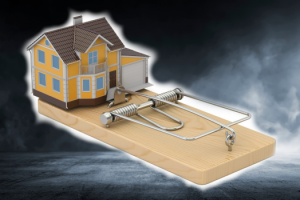Is your property protected against fraud?
 Property fraud may not be something you’d think would affect you. But beware, since 2009 HM Land Registry says it has prevented 254 fraudulent applications being registered, representing properties valued collectively in excess of £117 million.
Property fraud may not be something you’d think would affect you. But beware, since 2009 HM Land Registry says it has prevented 254 fraudulent applications being registered, representing properties valued collectively in excess of £117 million.
If you own a rented or empty property, live overseas, or own a mortgage-free property, it may pay for you to read on.
What is property fraud?
Property fraud happens when a fraudster steals your property by pretending to be the owner to mortgage, sell or otherwise dispose of property that doesn’t belong to them.
While the risk of this is still relatively low the impact on innocent victims has been huge.
Who is at risk of property fraud?
Not all property owners are vulnerable to property fraud, but the risk of this happening rises when:
- A property is empty
- If the owner is abroad or in a care home
- If the property is rented out and the owner lives far away
- When a property is mortgage free
- If there is a family dispute, such as divorce or separation
- When a property is unregistered and the deeds not secured.
How to protect yourself and your property against the risk of fraud?
While no system can be completely fraud proof we believe there are certain things a property owner can do to protect themselves from property fraud.
-
Register your property with HM Land Registry
An additional benefit to doing this is that you may be eligible for compensation should you find yourself to be a victim of property fraud. If you have the deeds then the registration process can be fairly straightforward. Upon submission of application together with proof of ownership and the required fee, properties can be registered within weeks.
Even if you have lost your deeds you can still be registered as the owner with HM Land Registry via a process known as reconstruction of title.
-
Apply to register a restriction against the registered title
Apply to the Land Registry using application Form RQ to place a restriction on your property, preventing the department from registering a sale or mortgage against it without a solicitor or conveyancer signing a certificate to confirm that the application has been made by you.
-
Sign up to HM Land Registry’s Property Alert service
The service is free and you can monitor up to 10 registered properties. HM Land Registry will then know to alert you to activity relating to those properties, such as new mortgage application or change in ownership, allowing you to make the judgement as to whether those activities are suspicious or not.
-
Keep HM Land Registry up to date with your contact details.
This can include up to three addresses, including an email and overseas addresses.
What you should do if you think you’ve been a victim of property fraud?
If you think you’ve been a victim of property fraud, you will need to seek advice immediately. The following organisations will be able to help:
- Contact Citizens Advice Bureau or Action Fraud
- Seek professional advice from your solicitor or bank
- Call HM Land Registry’s Property Fraud line on 0300 006 7030
We would certainly encourage our own clients to use this system as fraudsters use increasingly complex methods to make money out of properties they do not own.
If you’d like professional advice on how to protect your commercial property from fraud, our expert commercial lawyers can able to help. Get in touch today.